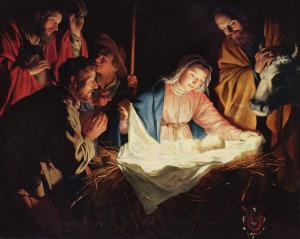 As the Christmas cards start to show up in the mail, one thing you can pretty much count on is seeing a lot of Jesus’ mother: Mary.
As the Christmas cards start to show up in the mail, one thing you can pretty much count on is seeing a lot of Jesus’ mother: Mary.
In an age when all of us, especially those who are younger, could really benefit from a wonderfully godly role model, the holiday season reminds us that Jesus’ mother Mary is a great candidate. She was likely a poor, unwed teenage girl. When she was informed that she would be the mother of Jesus, her first response was to worship the Lord in faith. Regarding Mary, I recently received this question:
First off, I want to say thank you! I have been tracking on and off with your podcast for years. After being introduced to you by my wife, and coming from Brazil and being raised culturally Catholic, and now married to a Christian woman in Canada, my theological devotion and knowledge has been tested greatly over the years!
In conversation this evening, I mentioned how a new Catholic acquaintance of mine remains very strongly devoted to the Virgin Mary. Although I identify as Christian, loving Jesus first and foremost, I said to my wife that I still also felt great devotion to the Virgin Mary.
My wife questioned this, stating that Jesus had brothers and sisters, and that the Bible states that Mary did not lay with Joseph until after Jesus’ birth.
My question is this: is Mary still a virgin?
What happened?
What does the Catholic Church say, and what does the Bible say?
If you have any resources you could point me to, I will be much appreciative.
I listen to you regularly with Podcasts on my commute to and from work.
All the best,
Luiz
Thank you for your encouragement and question. Your question is one that I had as a new Christian, as well.
Both my father’s and mother’s sides of the family have historically been Catholic. I was born in a Catholic Hospital and baptized in a Catholic Church as a baby. I also attended a Catholic school where I served as an altar boy assisting the priest with mass. My grandmother was a devout woman who joined an order of lay nuns after my grandfather passed away.
My experience with the Catholic Church has always been positive. I was not a Christian devoted to Jesus while attending mass growing up, but that was my own responsibility and not the fault of any person or organization. I simply did not have much interest in learning more about any faith.
There are certainly differences between Catholics and Protestants on some issues. A lot of people from both groups, however, will be together in heaven forever including relatives of mine on both sides of my family. There are also a lot of shared beliefs between the groups, including: the Bible is God’s Word, God is a Trinity of one God in three persons, Jesus is fully God and fully man, Jesus was born of the Virgin Mary, Jesus died on the cross for our sins, and He rose from the grave as our Savior.
When it comes to Mary, there are three things that may be helpful to begin with, since most Christians from both groups agree on these points. From what is agreed upon, we will then examine what is disagreed upon.
1. God promised that Jesus’ mother Mary would be a virgin.
Roughly 700 years before Jesus was born, the prophecy was given in Isaiah 7:14, “Therefore the Lord himself will give you a sign. Behold, the virgin shall conceive and bear a son, and shall call his name Immanuel’”.
This promise was fulfilled in Matthew 1:18-32, which says, “Now the birth of Jesus Christ took place in this way. When his mother Mary had been betrothed to Joseph, before they came together she was found to be with child from the Holy Spirit. And her husband Joseph, being a just man and unwilling to put her to shame, resolved to divorce her quietly. But as he considered these things, behold, an angel of the Lord appeared to him in a dream, saying, ‘Joseph, son of David, do not fear to take Mary as your wife, for that which is conceived in her is from the Holy Spirit. She will bear a son, and you shall call his name Jesus, for he will save his people from their sins.’ All this took place to fulfill what the Lord had spoken by the prophet: ‘Behold, the virgin shall conceive and bear a son, and they shall call his name Immanuel’ (which means, God with us)”.
2. Mary was a godly woman wrongly accused of sexual sin.
In John chapter 8 there is a debate between Jesus and some religious folks over God the Father and who their fathers were. In this heated exchange, Jesus says that their father is not God, but rather the Devil. In John 8:41, “They said to him, “We were not born of sexual immorality. We have one Father—even God.” Their retort was that Jesus was born to an unknown father because his mother Mary was allegedly guilty of promiscuity before her marriage to Joseph.
Enemies, critics, and liars are prone to say just about anything about someone to try to ruin their reputation. In the case of Jesus, they stooped so low as to not only attack him, but also his mother. Their hope was likely to discredit the entire family by painting Mary as a delusional, promiscuous, lying woman who raised a son with similar character. This kind of smear tactic is tragic and continues today. Thankfully, the Internet was not yet available, or this could have been an even more public and painful false attack against a young woman under great pressure.
3. Mary was a virgin up until the time the Jesus was born.
Just prior to Jesus’ birth, a government census was called. This required that Joseph and the very pregnant Mary travel to their family hometown of Bethlehem. We read in Luke 2:5, “He went there to register with Mary, who was pledged to be married to him and was expecting a child.” The emphasis on them being pledged is to affirm that they were not yet married since they had not consummated their relationship.
It is also stated in Matthew 1:18, “This is how the birth of Jesus the Messiah came about: His mother Mary was pledged to be married to Joseph, but before they came together, she was found to be pregnant through the Holy Spirit.” The emphasis here is even more clear that they had not consummated their marriage.
More confirmation of Mary’s virginity prior to the birth of Jesus is found in Matthew 1:20 which says, “…an angel of the Lord appeared to him in a dream and said, “Joseph son of David, do not be afraid to take Mary home as your wife, because what is conceived in her is from the Holy Spirit.” Understandably, the young Joseph is devastated. The young woman of his dreams, whom he was awaiting to marry, was found pregnant. Like any reasonable young man, his first thought was that she had been unfaithful to him. But, the angel was clear that she was a godly woman who would make a wonderful wife and was innocent of the false claims.
The next few verses in Matthew are abundantly clear that Mary did not have any intimate relations with Joseph until after Jesus was born. Matthew 1:24-25 says, “When Joseph woke up, he did what the angel of the Lord had commanded him and took Mary home as his wife. But he did not consummate their marriage until she gave birth to a son. And he gave him the name Jesus.” The timing here is important. The marriage was consummated, but not until after Jesus was born.
4. There is a debate about sexual activity between Mary and her husband Joseph after Jesus was born.
There are, broadly speaking, two general categories of thought regarding the perpetual virginity of Jesus mother Mary. It is said, “Perpetual, is ascribed to the mother of our Lord by the Eastern or Greek Church…and by the Roman, which calls her Semper Virgo. In every age of the Church, however, there have been those who have maintained that she only continued a virgin till the nativity of Christ.”
The concept of Mary being a virgin throughout her entire life, both before and after the birth of Jesus, was taught by theologians such as Origen, John Wesley, John Calvin, Martin Luther, Ulrich Zwingli, and others. We also find this concept in various other respected Christian teachings: “The Second Helvetic Confession and the Geneva Bible of the Reformed faith and the Schmalkald Articles of the Lutheran churches affirm it.”
Theologian Donald Bloesch says, “In the emerging Catholic tradition Mary was hailed as the Virgin Mother, and this encompassed far more than the virginal conception. It was said that Mary was a virgin not only before Jesus’ birth (ante partu) but also during his birth (in partu) and after his birth (post partum). Many in the church succumbed to a docetic mentality when they envisaged Jesus as simply passing through the wall of Mary’s uterus so that her hymen was not ruptured. Their reluctance to affirm that Jesus shared in the ordinary human processes of human birth connoted a gnostic depreciation of earthly existence.”
Cases for the perpetual virginity of Mary arose as early as the second century, grew in popularity the fourth century, and culminated with the Second Council of Constantinople. At that time, (553 A.D.) Mary was declared to be Mary “ever virgin.”
5. The Bible says that Mary had children other than Jesus.
The following are the Bible verses which clearly state that Jesus had other brothers and sisters born to his mother Mary. They would technically be his half-brothers and half-sisters since they also had Joseph as their biological father. Nonetheless, this confirms that Mary and Joseph enjoyed a normal, healthy, holy intimate marital relationship after Jesus was born:
- Matthew 12:46-While he [Jesus] was still speaking to the people, behold, his mother and his brothers stood outside, asking to speak to him.
- Matthew 13:55–56-Is not this the carpenter’s son? Is not his mother called Mary? And are not his brothers James and Joseph and Simon and Judas? And are not all his sisters with us?
- Mark 3:31–32 31-And his [Jesus] mother and his brothers came, and standing outside they sent to him and called him. And a crowd was sitting around him, and they said to him, “Your mother and your brothers are outside, seeking you.”
- Mark 6:3-Is not this the carpenter, the son of Mary and brother of James and Joses and Judas and Simon? And are not his sisters here with us?
- Luke 8:19–20-Then his mother and his brothers came to him, but they could not reach him because of the crowd. And he was told, “Your mother and your brothers are standing outside, desiring to see you.”
- John 2:12-After this he went down to Capernaum, with his mother and his brothers and his disciples, and they stayed there for a few days.
John 7:3, 5, 10-So his brothers said to him, “Leave here and go to Judea, that your disciples also may see the works you are doing”…For not even his brothers believed in him…But after his brothers had gone up to the feast, then he also went up, not publicly but in private.
- Acts 1:14-All these with one accord were devoting themselves to prayer, together with the women and Mary the mother of Jesus, and his brothers.
- 1 Cor. 9:5-Do we not have the right to take along a believing wife, as do the other apostles and the brothers of the Lord and Cephas?
- Gal. 1:19-I saw none of the other apostles except James the Lord’s brother.
- Jude 1-Jude, a servant of Jesus Christ and brother of James.
Who are these “brothers” and “sisters” of Jesus? This debate ensues with three basic lines of thinking.
One, these are children from the first marriage of Jesus’ adoptive father Joseph from a marriage prior to Mary; therefore, Jesus had older step-brothers and step-sisters. There is zero evidence for this view in Scripture, and it is speculative at best.
Two, the words used in the Bible for “brothers” and “sisters” have a broad meaning and refer not to Jesus’ immediate family but rather extended family members such as cousins.
This is possible, but not the plainest reading of the Scriptures. In fact, the Bible never plainly states this theory.
Three, the references are to Jesus’ younger half brothers and half sisters born to Mary and Joseph after Jesus’ birth. This is the most probable view and results from the plainest reading of Scripture. Today, Catholics tend toward explanations one or two, whereas Protestants like myself prefer the third explanation.
Luiz, thank you for your encouragement and question. I hope this is clarifying for you. And, since I’m guessing other bloggers will provide their comments (including my spiritual brothers and sisters in the Catholic church), I look forward to learning from their insights as well.
1 John M’Clintock and James Strong, “Virginity, Perpetual,” Cyclopædia of Biblical, Theological, and Ecclesiastical Literature (New York: Harper & Brothers, Publishers, 1881), 800.
2 Donald G. Bloesch, Jesus Christ: Savior & Lord (Downers Grove, IL: InterVarsity Press, 1997), 86–87.
3 Donald G. Bloesch, Jesus Christ: Savior & Lord (Downers Grove, IL: InterVarsity Press, 1997), 86–87.












